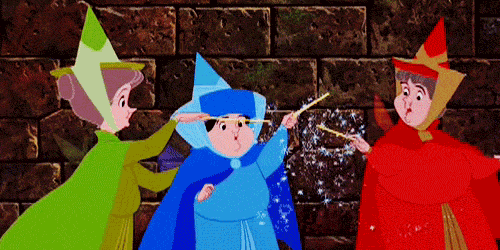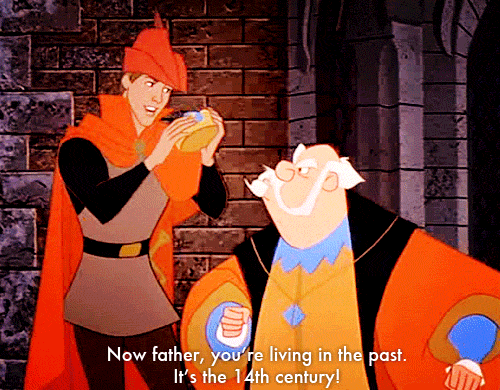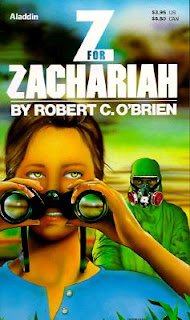Monday Musings: Why Disney's Sleeping Beauty is NOT Aurora's Story
Sleeping Beauty is one of those Disney films I love to come back to again and again. It has beautiful animation, humor, and some interesting magical characters. But over the years, I've come to think of it less as Aurora's story and more as the story of fairy politics. This belief was only reinforced by our weekend attempt to introduce Samwise to the movie (he was about as interested as he is in anything not Moana, which is to say very interested for about 5 minutes and then sporadically interested when he wasn't playing with toys).
This is something a lot of people criticize about Sleeping Beauty: its protagonist . . . doesn't do much in the film. She sings, she wanders the woods while the "dears" prepare a birthday surprise, she meets a man, she submits to having her life turned upside down, and then she falls under the spell of the villain. She also has the fewest lines of dialogue of any Disney princess ever. She simply doesn't have a large role in what is ostensibly her story.
(I would argue that part of this problem is caused by the film's deviance from the main plot to indulge in some unnecessary--though still enjoyable--humorous sequences such as the fairies' birthday preparations and the argument between Kings Stefan and Hubert over how soon Aurora and Philip should get married. What Aurora's unnamed mother thinks we're never told.)
From Maleficent's arrival at the christening to the good fairies' aid in Philip's climactic battle, there's no doubt that it is the magical beings who make the world move in this story. The good fairies (specifically called "the 3 good fairies" as if there are only 3 good fairies to be found) are given exalted places at the royal gathering. Maleficent is well-known enough that the monarchs could have invited her, but chose not to (a serious breach of etiquette in those days if they didn't want to court open war)*. The fairies are given enough weight in the royal circles that without hesitation (though not without sadness), Stefan and his queen send their infant daughter to live with the fairies for 16 years. Every major plot development in this movie happens because of fairy magic (Maleficent's curse, Philip's freedom, the sleeping castlefolk, Maleficent's defeat, and yes, even Philip and Aurora meeting--he only stops because of her beautiful singing, which if you recall was Fauna's gift at Aurora's christening).
* In fact, you could argue that this was an ulterior motive. Remember in the christening scene when Maleficent arrives? She is cool and collected and willing to overlook the fact that she wasn't invited until Merryweather adds insult to insult and says, "You weren't wanted." Merryweather knows this isn't the best thing to say, but can't (or doesn't) resist the urge to let Maleficent know what she thinks of her. It's entirely possible that the good fairies (their influence being so mighty in these parts) convinced the king and queen not to invite Maleficent so they could have some excuse to bring a stop to her at last. They claim Maleficent's powers are far beyond their own, but somehow they still are the key powers in her defeat. They adjust Maleficent's curse from death to sleep and then give Philip everything he needs to defeat Maleficent--including the sword that kills her and the spell that sends it flying to her heart. So how exactly is Maleficent beyond them? It must be that they require a human champion to fight for them, and what better motivation for that champion than true love?
A further bit of evidence for (at least one of) the fairies being a bit more powerful and insightful than they let on, even to each other, is the fact that they leave her alone before sunset. Fauna asks later why they left her alone, but Flora (always the idea-generator and sort of self-appointed leader) says they'll give Aurora some time alone because she's so grieved by losing her unnamed suitor and her life in the woods. They know Maleficent is looking for Aurora (though perhaps not that their magic duel earlier led Maleficent to their newly abandoned cottage), and yet they leave Aurora unattended with minutes to spare before the curse is completely avoided. Why do this if not to push Philip into battle with Maleficent?
All that being said, I think a quick note about Philip and Aurora's love story needs to be added. This romance seems typical of the classic Disney trope both Enchanted and Frozen poked fun at.
However, it deserves mentioning that Philip is the one who is set on marriage. It isn't Aurora who is completely swept away by her suitor but Philip who is swept away by her. Aurora only wants to see him again, to introduce him to the dears, to see what might come of this chance meeting (which seems to take only moments, but which the timing of the sun tells us lasts for a few hours if not most of the day). Philip charges to the castle to tell his father he's going to marry this wood sprite or peasant girl or whatever she may be. (Though if Aurora had thought to ask his name before he asked hers, we might have been saved some nonsense.) It's possible that Philip's determination is part of the magic of Aurora's enchanted voice (which would explain why the fairies were so determined to keep her from meeting people, if Maleficent's search and Aurora's being betrothed to Philip weren't enough). Philip even gets in a little jab at tradition while he's at it.
Sleeping Beauty is still a Disney film I enjoy, and I will definitely come back to watch it again (hopeful that next time Samwise will be more interested), but as I grow older I'm beginning to see the flaws in the story (I can't really find any with the animation).
What do you think of Sleeping Beauty? Is Aurora a weak character or is the story just not written around her like we've always thought? Let me know in the comments!
Exhibit A: Her (In)Active Role
This is something a lot of people criticize about Sleeping Beauty: its protagonist . . . doesn't do much in the film. She sings, she wanders the woods while the "dears" prepare a birthday surprise, she meets a man, she submits to having her life turned upside down, and then she falls under the spell of the villain. She also has the fewest lines of dialogue of any Disney princess ever. She simply doesn't have a large role in what is ostensibly her story.
(I would argue that part of this problem is caused by the film's deviance from the main plot to indulge in some unnecessary--though still enjoyable--humorous sequences such as the fairies' birthday preparations and the argument between Kings Stefan and Hubert over how soon Aurora and Philip should get married. What Aurora's unnamed mother thinks we're never told.)
Exhibit B: The Fairies Do Everything
From Maleficent's arrival at the christening to the good fairies' aid in Philip's climactic battle, there's no doubt that it is the magical beings who make the world move in this story. The good fairies (specifically called "the 3 good fairies" as if there are only 3 good fairies to be found) are given exalted places at the royal gathering. Maleficent is well-known enough that the monarchs could have invited her, but chose not to (a serious breach of etiquette in those days if they didn't want to court open war)*. The fairies are given enough weight in the royal circles that without hesitation (though not without sadness), Stefan and his queen send their infant daughter to live with the fairies for 16 years. Every major plot development in this movie happens because of fairy magic (Maleficent's curse, Philip's freedom, the sleeping castlefolk, Maleficent's defeat, and yes, even Philip and Aurora meeting--he only stops because of her beautiful singing, which if you recall was Fauna's gift at Aurora's christening).
* In fact, you could argue that this was an ulterior motive. Remember in the christening scene when Maleficent arrives? She is cool and collected and willing to overlook the fact that she wasn't invited until Merryweather adds insult to insult and says, "You weren't wanted." Merryweather knows this isn't the best thing to say, but can't (or doesn't) resist the urge to let Maleficent know what she thinks of her. It's entirely possible that the good fairies (their influence being so mighty in these parts) convinced the king and queen not to invite Maleficent so they could have some excuse to bring a stop to her at last. They claim Maleficent's powers are far beyond their own, but somehow they still are the key powers in her defeat. They adjust Maleficent's curse from death to sleep and then give Philip everything he needs to defeat Maleficent--including the sword that kills her and the spell that sends it flying to her heart. So how exactly is Maleficent beyond them? It must be that they require a human champion to fight for them, and what better motivation for that champion than true love?
A further bit of evidence for (at least one of) the fairies being a bit more powerful and insightful than they let on, even to each other, is the fact that they leave her alone before sunset. Fauna asks later why they left her alone, but Flora (always the idea-generator and sort of self-appointed leader) says they'll give Aurora some time alone because she's so grieved by losing her unnamed suitor and her life in the woods. They know Maleficent is looking for Aurora (though perhaps not that their magic duel earlier led Maleficent to their newly abandoned cottage), and yet they leave Aurora unattended with minutes to spare before the curse is completely avoided. Why do this if not to push Philip into battle with Maleficent?
All that being said, I think a quick note about Philip and Aurora's love story needs to be added. This romance seems typical of the classic Disney trope both Enchanted and Frozen poked fun at.
However, it deserves mentioning that Philip is the one who is set on marriage. It isn't Aurora who is completely swept away by her suitor but Philip who is swept away by her. Aurora only wants to see him again, to introduce him to the dears, to see what might come of this chance meeting (which seems to take only moments, but which the timing of the sun tells us lasts for a few hours if not most of the day). Philip charges to the castle to tell his father he's going to marry this wood sprite or peasant girl or whatever she may be. (Though if Aurora had thought to ask his name before he asked hers, we might have been saved some nonsense.) It's possible that Philip's determination is part of the magic of Aurora's enchanted voice (which would explain why the fairies were so determined to keep her from meeting people, if Maleficent's search and Aurora's being betrothed to Philip weren't enough). Philip even gets in a little jab at tradition while he's at it.
Sleeping Beauty is still a Disney film I enjoy, and I will definitely come back to watch it again (hopeful that next time Samwise will be more interested), but as I grow older I'm beginning to see the flaws in the story (I can't really find any with the animation).
What do you think of Sleeping Beauty? Is Aurora a weak character or is the story just not written around her like we've always thought? Let me know in the comments!








I agree with you! I also think that the "remake" even solidifies the idea of the "fairies" (in the case of the new one, a fairy) being the protagonist. In Maleficient, she casts the curse because of her hate for Stefan betraying her and her heart and she knew that this new child of his was his own heart and she wanted revenge.
ReplyDeleteLike you said, Fairy politics.
Yep. Aurora gets more development in the movie named for Maleficent than she does in her "own" movie.
DeleteYup. I've seen similar analyses elsewhere, and think that you are right 100%. The fairies are the true protagonists of the film.
ReplyDeleteIt's nice to know I'm not the only one who's taken this view. I'd seen complaints about Aurora's passivity before, but not any analyses that put forth the fairies as the protagonists.
DeleteI agree. It's still a fun, silly movie but Aurora is very passive. It's be fun to read a rewrite that exposed the fairies "plot."
ReplyDeleteI recently read Waking Beauty by Sarah E Morin. It was a very well-written retelling that focuses on after the prince rescues her - only she doesn't believe she's awake!
(Yeah, the more I've thought about this topic this week, the more I've realized how much I want to rewrite this movie. XD)
DeleteOoh! I'll have to look that one up. I haven't read many Sleeping Beauty retellings. Cameron Dokey's Beauty Sleep was pretty good, but moved too quickly for me.